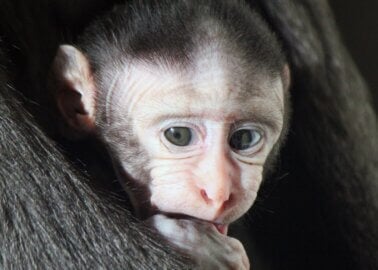World Monkey Day: 114,884 Supporters of PETA Affiliates Speak Up for Monkeys at Europe’s Largest Primate Research Lab
Today is World Monkey Day, but the primates at the Biomedical Primate Research Centre (BPRC) in Rijswijk, the Netherlands, have nothing to celebrate.
At Europe’s largest primate laboratory and breeding centre, approximately 1,500 monkeys are used for breeding and many are experimented on. Highly intelligent, social macaques and marmosets – who, in their natural habitats, explore and roam vast grasslands and lush forests, are often shaved, crudely tattooed, left prone to injuries as a result of drugging, placed in restraint cages, and infected with debilitating diseases and may be killed in full view of their companions.
This World Monkey Day, more than 110,000 compassionate people have joined PETA and our international affiliates in demanding that the Dutch government take swift and decisive action to spare sensitive, intelligent primates immense suffering at the BPRC.
The Members of Parliament who received the petition and its signatures during the digital hand-in today whole-heartedly agreed with the requests made in it and promised to discuss them with ministers during the next parliamentary meeting about animal testing.
The evidence documenting the overwhelming failure of animal experiments continues to grow. Scientists all around the world agree that data garnered from deliberately poisoning monkeys, giving them brain damage, or inducing infectious diseases in them can’t be readily applied to humans.
So it’s not surprising that the market for human-relevant in vitro technology for use in biomedical research and chemical and drug safety and efficacy testing is growing rapidly. If the BPRC and the Dutch government, which provides the centre with funding, want to stay ahead of the game when it comes to biomedical breakthroughs, they must move away from unreliable animal experiments and towards superior, non-animal methods.
PETA commends the Dutch government for aiming to become a global leader in animal-free science, but as long as monkeys continue to endure a living nightmare at the BPRC, this goal will never be reached.

In our petition, we urge the government to take the following steps:
- Assist the BPRC in developing a plan to end the breeding and use of primates in experiments and to transfer the animals to reputable sanctuaries as soon as possible
- Require the BPRC to conduct regular and transparent reporting on its progress towards ending animal experiments and breeding
- Develop a plan for ending the use of all primates in experiments across the Netherlands
- Increase funding for the development of non-animal research methods
The primate species most commonly used in laboratories around the world include rhesus macaques, crab-eating macaques, marmosets, baboons, and squirrel monkeys. In their natural habitats, these monkeys may travel for miles, foraging for a variety of foods, socialising with family and friends, and engaging in various other activities – such as climbing hills, swimming, and caring for their young.
In laboratories worldwide, they may be caged alone, prevented from engaging in the social interaction that they so desperately need in order to thrive, and deprived of any meaningful control over their lives.

We need to shift away from all experiments using monkeys or other animals. It’s time for the Research Modernisation Deal!
PETA’s Research Modernisation Deal maps out a strategy for replacing the use of animals in biomedical research and regulatory testing. With greater investment in animal-free methods, scientists across Europe would be able to develop better treatments for human diseases as well as more reliable methods for toxicity assessment. And, crucially, this would help end the almost unimaginable suffering of millions of mice, rats, dogs, primates, rabbits, fish, monkeys, and other animals.
Please sign our petition urging the government to implement a policy mandating an end to animal experimentation and providing a clear strategy and timeline for achieving this goal.



